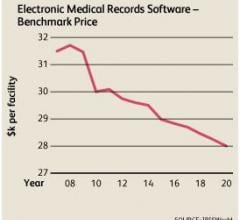February 28, 2008 - Search giant Google launched Google Health and announced major industry partners on Thursday, aiming to be the Intuit for personal healthcare, where people can access all their health information in one spot.
Google Chief Executive Eric Schmidt answered reporters' questions after announcing Google Health.
"Why would Google be here?" Google CEO Eric Schmidt said during a keynote speech at the Health Information Management Systems Society (HIMSS) trade show, which he said was not one the company has normally attended. "What's the most important search I could do?"
The answer: health. Nearly one out of two Americans has a chronic health condition, he said. Meanwhile, people are already using the Web to get information, including one man, who told Google a search for heart attack symptoms on Google led him to call an ambulance and saved his life, Schmidt said.
"We're going to partner with leaders in healthcare to cross-connect...and apply the principles of the Internet" to improve the industry, he said. "The first principle is, it's the user's data. The data follows the consumer wherever they go" when they change doctors or insurers.
Currently, there are more than 200 personal health record systems that are closed or tethered to a particular health system, he said.
Google Health aims to untether the 2 billion X-rays taken in the U.S. each year, 62 million CAT scans, and other health data, and put them all online for the patients to access.
Future partners include major hospitals, pharmacies, and insurers, including Walgreen, Aetna, Wal-Mart Stores, the University of California at San Francisco, the American Heart Association, Quest Diagnostics, Long's Drugs, the American Medical Association, Cedars-Sinai Medical Center, and the Lucile Packard Children's Hospital at Stanford University.
Google turned to experts in the field in creating Google Health and formed a health advisory council that included Dean Ornish of the Preventive Medicine Research Institute, Molly Coye of HealthTech, Paul Tan of the Palo Alto Medical Foundation, and Sharon Terry of the Genetic Alliance.
A Google employee who is also an emergency room doctor demonstrated Google Health, which was previewed at Google's booth at the HIMSS show.
The system stores all the health records of a patient and enables users to import records from different health provider systems, as well as search for doctors and get information on conditions from Google Scholar, discussion groups, and other sources.
Google Health lets consumers get information about medical conditions, including illustrations to help identify symptoms, as this screenshot from CEO Eric Schmidt's keynote shows.
(Credit: Elinor Mills/CNET News.com)
Third-party developers have created gadgets that can be embedded in iGoogle home pages for things like alerts to remind patients to take their medicine, and other developers have created interfaces for displaying a weekly view of all the medicines a patient takes.
During a question-and-answer session, a physician told Schmidt that he has "a pang about 'Big Brother Google' knowing so much about me." Schmidt assured him that the system would be safe and secure, and that no information could be shared with anyone without permission from the user.
During a news conference after the keynote speech, Schmidt said that if the government tries to subpoena Google for the consumer records, the company would have to comply, but he hinted in answering a follow-up question that patients could circumvent that by deleting their records.
"We are subject to U.S. law. In the case where we are forced by court to turn over information, we would do it," he said. "If the information were not there, it would be (hard) to subpoena it," he added.
Asked if insurance companies would have access to the data, Schmidt said that barring a law, the only way Google would share with insurers is "if someone were to force us with a gun to do it."
"We have taken a pretty aggressive position with regard to protecting (consumer) privacy in the U.S., but we are subject to U.S. law," he said.
Earlier, an attendee asked whether Google has a "monetization path" for Google Health.
"Not in the short term," Schmidt said, adding that the hope is that people using the site will also use other Google sites and ultimately click on ads there. Google News similarly drives people to search on Google.
Source: Elinor Mills/CNET News.com
For more information: www.Google.com


 June 14, 2024
June 14, 2024 









